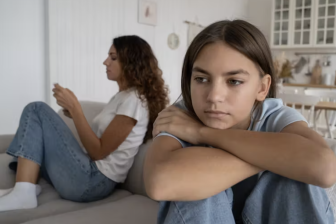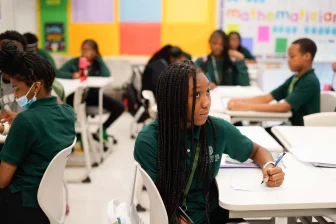
How to find a place for kids to play in the pandemic
Can parents and educators support opportunities for children to play, when so many of their activities are restricted by COVID-19?. That’s the question posed by Elizabeth Cushing, the president of Playworks, a US non-profit children’s play champion.
“We are justifiably worried about America’s kids.
“Their routines and communities were dramatically disrupted by the COVID-19 virus. In many cases, they faced, over an extended period of time, chaos created by the pandemic, loss of friendships and family connections, and family financial insecurity, to name a few sources of stress and fear. Millions of kids’ daily experiences are diminished by the loss of in-person school.
“The interruption of schooling not only affects academic learning; it also reduces socialization and the sense of belonging to a community. Experts across the health disciplines are warning that the effects of social isolation will be unprecedented, and that the pandemic could inflict long-lasting emotional trauma and even post-traumatic stress disorder.
“One new paper by Maria Elizabeth Loades and her colleagues reviewed 83 studies of social isolation and loneliness in children and adolescents—and found that periods of isolation increased the risk of depression up to nine years later. They also found that it is the duration, not intensity, of loneliness that seemed to drive anxiety and depression.
‘There is something there beyond just fun’
“We actually know a great deal about how to support children who have experienced trauma, thanks to the work of pediatricians, mental health experts, and educators who have demonstrated in practice what research has found. With 25 years of supporting kids and teachers in elementary schools, we at Playworks enthusiastically recommend one simple strategy for healing, reconnecting, and designing experiences at school that will enable all kids to thrive again: play.
“As a developmental behavior, play has a remarkable track record. It’s an intrinsically motivated behavior that inspires our youngest (and most vulnerable) community members to take risks, try new things, and form new relationships, even with strangers, and yet it has survived millennia of evolutionary pressure. There is something there beyond just fun and games or physical activity.
“Play allows children to use their creativity while developing their imagination, dexterity, and physical, cognitive, and emotional strength,” says the American Academy of Pediatrics. “Play allows children to create and explore a world they can master, conquering their fears while practicing adult roles.”
“In our experience, the benefits of play for children include physical, cognitive, social, and emotional development. How can parents and educators support opportunities for children to play, when so many of their activities are restricted by COVID-19? We need to start by understanding play—what it is and why it matters. If we do that, then we can intentionally create new ways to play that we might not have even imagined before the pandemic.
Why kids need to play
“Observe a playground, classroom, or your own children at home as they freely play with each other, and you’ll see the building blocks of social interaction developing right in front of you. Children learn how to share, cooperate, negotiate, and resolve conflicts by playing together.
“When play breaks down, children’s drive to keep playing inspires them to find a new way to get past the disagreement and start again. They experiment with conflict resolution, communication, and compromise. The cycle repeats, and their development continues.
“Children also build relationships through play, including with other kids who are similar and different. These relationships develop through both the joy and conflict that are inherent in playing.
“As we’ve seen at recess across America, it’s possible to create opportunities for authentic inclusion through play, making the invitation to join in a game as expected and normed as saying “please” and “thank you.”
“It’s not just kids who develop social connections through play. The kids know they have mastery in play, inherently. It is the one activity where the adults do not necessarily know more than they do. When joined by teachers and parents, children playing understand that they matter and that playing is a valuable activity to adults—and the grownups develop connections with the kids and with each other.
Children also build relationships through play
“Researchers have recently asked deeper questions about the benefits of playing in the context of social-emotional development and critical life skills. In a 2019 study examining the correlation of the quality of play at recess with student behavior, researchers William Massey and John Geldoff found four statistically significant findings:
- Executive functioning: The cognitive skills that help a child focus attention, remember details, solve problems, and make plans.
- Resilience: The ability to overcome adversity, quickly recover from mistakes, cope with change, and solve problems.
- Emotional self-control: The ability to resist immediate temptations and avoid acting on impulse in response to environmental changes.
- Positive classroom behavior: These behaviors include adaptability (e.g., able to transition), functional communication, leadership, social skills, and study skills.
“With all this science behind it, why is play often left out of the list of levers for accelerating learning? Perhaps the answer lies in our understanding of what play actually is.
“Bernard Suits defined a game as “the voluntary attempt to overcome an unnecessary challenge.”
“If it’s unnecessary then how can it be valuable? While it sounds like a conundrum, the answer is simple. To feel the answer, play with kids and observe your own experience. The impact lies not in what is accomplished—for example, winning a game—but rather in the cognitive, social, and emotional effects of playing. It’s the how not the what.
“Perhaps Alison Gopnik, professor of psychology and philosophy at UC Berkeley, describes it best:
The irony is that over the long term, both children’s and adults’ play does lead to practical benefits. But it does this precisely because the people who play, whether they are children or adults, aren’t aiming at those practical benefits. The fundamental paradox of play is that in order to be able to reach a variety of new goals in the long run, you have to actively turn away from goal seeking in the short run.
“That “feel good” basis for encouraging play matters more than ever as we look to the coming months and next school year. We know parents and teachers are concerned about the learning loss students have experienced and the enormous task of getting everyone back on track.
“While play may not sound like the antidote to learning loss, we at Playworks would like to suggest that when we transition back to school buildings, we must create positive conditions for children before we have any hope of addressing academic needs. There is an opportunity in the midst of this great upheaval in public education to either continue things as they were—or to ensure an equitable and joyful investment in time and space for play for all kids.
How to play in a pandemic
“Right now, playing socially with others in person is not widely possible. Parents are exhausted from trying to manage their children in online school. And we’re hearing from educators across the country that they are sadly missing opportunities to play with their students and the relationships that come from that shared experience. Teachers aren’t able to build rapport with children in the same way online.
“However, we can, and we are, translating play online, adapting games, even with young kids, so they can move and laugh and interact over video. And when schools reopen, we have the chance to build play into the school day intentionally and with new understanding about how conditions for learning are vastly improved when kids get to play together. Here are some suggestions to consider for inspiring more play right now:
- As we wait for the vaccine, playing virtually is happening all across the country. It is possible to adapt games like a Scavenger Hunt or Simon Says or Freeze Dance to video platforms. Check out playworks.org for our Safe Return to Play Guide featuring dozens of our team’s favorite games.
- Build a new sense of routine and consistency by opening and closing the school day with play. It can be a ritual and a signal that our community is coming together, an experience we no longer take for granted.
- Jump in the game with the kids. It is both inspiring and important to be a player alongside children, to model how to “get out” gracefully and to norm the positive language that keeps the space feeling safe for all kids.
- Leverage the power of play for resolving disagreements. Rock/Paper/Scissors is a simple, arbitrary game that can resolve any dispute, speeding the return to play and offering a graceful way forward.
“Once vaccines are widely available over the next six months, we’re going to enter a transitional period. Here are some suggestions to consider for approaching play and recess when moving to a new normal:
- Imagine how play might be a beautiful way to help kids and grownups reconnect in person. Incorporate games into welcoming activities and the early days of forming class communities to build rapport.
- Use play to help children see and celebrate their differences and similarities. Games like “Superstar” and “I Love My Neighbor” are fun, low-stakes ways to build individual relationships.
- Create opportunities for kids to own and lead their own play. For example, they can “map the playground” to determine how best to redesign the space to make the most of the games they really love, nominate games to be the “game of the week” for the whole school community, or create their own modifications to existing games.
“For more practical advice, Jill Vialet, founder of Playworks, calls for intentionally designing play into the return to school in a downloadable School Re-Opening Workbook. Her recommendation is to focus on how play can support the transition by using space and creating new rituals to connect children and adults.
“The gift of play is the way it teaches us how to deal with the unexpected,” writes Gopnik in a 2016 article called “In Defense of Play.” In such an unexpected situation as the one we find ourselves in now, and what we still face over the coming months, the gift of play is exactly what we all need.
First published by Greater Good Magazine, University of California, Berkeley.
Playworks is a US-based non-profit organisation that works to improve the health and well-being of children by increasing opportunities for physical activity and safe, meaningful play.




